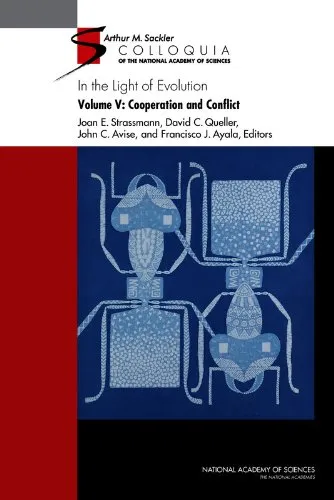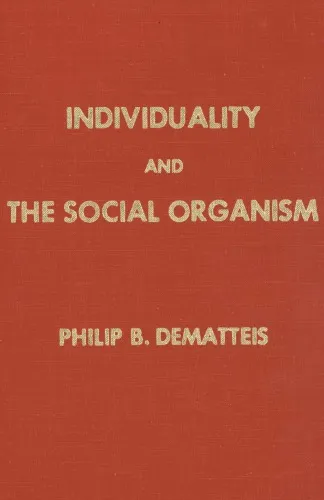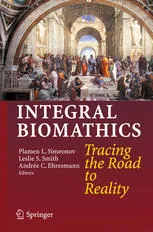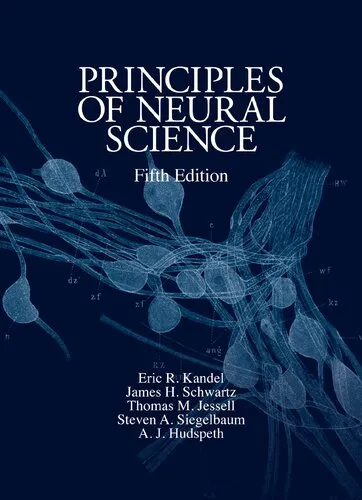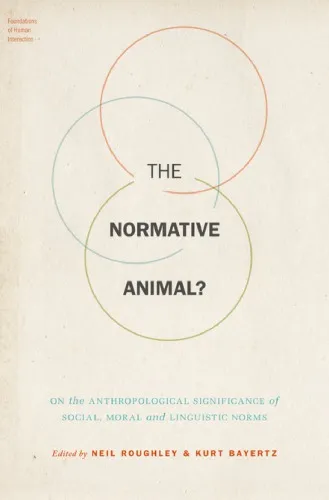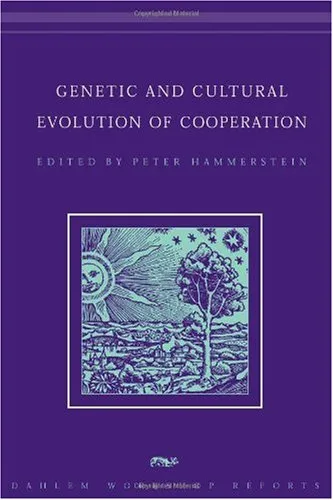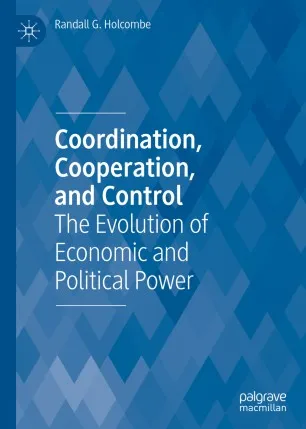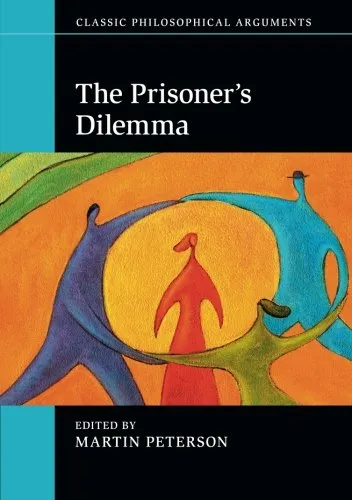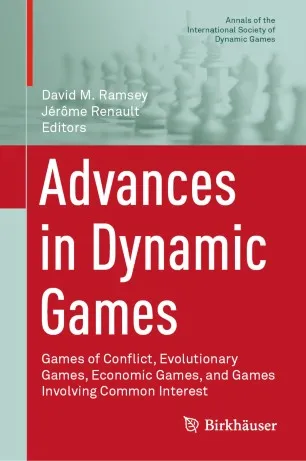In the Light of Evolution V: Cooperation and Conflict
4.5
بر اساس نظر کاربران

شما میتونید سوالاتتون در باره کتاب رو از هوش مصنوعیش بعد از ورود بپرسید
هر دانلود یا پرسش از هوش مصنوعی 2 امتیاز لازم دارد، برای بدست آوردن امتیاز رایگان، به صفحه ی راهنمای امتیازات سر بزنید و یک سری کار ارزشمند انجام بدینکتاب های مرتبط:
معرفی کتاب "In the Light of Evolution V: Cooperation and Conflict"
کتاب "In the Light of Evolution V: Cooperation and Conflict" مجموعهای تخصصی و جامع است که به بررسی تعاملات پیچیدهای میپردازد که در دنیای زیستشناسی بین همکاری و تضاد وجود دارد. این اثر با قلم نویسندگانی برجسته چون Joan E. Strassman، David C. Queller، John C. Avise و Francisco J. Ayala، مفهومی میانرشتهای از زیستشناسی، جامعهشناسی، روانشناسی و حتی فلسفه را به خواننده منتقل میکند.
خلاصهای جامع از محتوای کتاب
کتاب "In the Light of Evolution V: Cooperation and Conflict" تلاش میکند تا ابعاد مختلف تکامل زیستی را از دیدگاه همکاری و رقابت بررسی کند. این کتاب به سؤالهای اساسی همچون «چگونه همکاری در جوامع موجودات زنده به وجود میآید؟» و «چه عواملی منجر به شکلگیری تضاد یا رقابت میشود؟» پاسخ میدهد. نویسندگان این اثر با استفاده از تحقیقات علمی گسترده و تحلیلهای چندلایه، مفاهیم بنیادین Evolution و اهمیت آن را در پیوند میان شبکههای همکاری و مکانیسمهای رقابتی آشکار میکنند.
نکات کلیدی کتاب
- توضیح نحوه تکامل ویژگیهای اجتماعی در گونههای مختلف.
- بررسی الگوهای همکاری و تضاد در جوامع انسانی و غیرانسانی.
- تحلیل عوامل ژنتیکی و محیطی که همکاری یا تضاد را تسهیل میکنند.
- نحوه تأثیر Evolution بر تصمیمگیریهای گروهی و فردی.
- توضیح مکانیسمهایی نظیر Altruism، Selfishness و Kin selection در زیستشناسی.
نقلقولهای برجسته از کتاب
"Collaboration is not the opposite of competition, but rather its counterpart under the ever-driving force of evolution."
"From the tiniest bacterial communities to the vast networks of human societies, cooperation and conflict are the twin engines of evolution."
چرا این کتاب اهمیت دارد؟
اثر "In the Light of Evolution V: Cooperation and Conflict" اهمیت ویژهای برای متخصصان زیستشناسی و نیز خوانندگان علاقمند به علوم تکاملی و اجتماعی دارد. این کتاب فرصتی نادر برای درک بهتر مکانیسمهای حیاتی که بر زندگی موجودات زنده، از کلونیهای میکروبی گرفته تا جوامع پیچیده انسانی، اثرگذارند، فراهم میآورد. در واقع، این اثر نه تنها اطلاعات علمی ارزشمندی ارائه میدهد، بلکه نگاه تازهای به پیوند عمیق بین رفتارهای اجتماعی و تکامل ارائه میکند.
این کتاب برای محققان، دانشجویان و تمامی افرادی که به دنبال تحلیل دقیقتری از تعاملات زیستی هستند، بهعنوان منبعی قابلاتکاست. همچنین، چگونگی تأثیرگذاری تضاد و همکاری بر تکامل درک ما از زیستشناسی را عمیقتر میکند.
Introduction to "In the Light of Evolution V: Cooperation and Conflict"
"In the Light of Evolution V: Cooperation and Conflict" is an insightful journey into the intricate and multifaceted dynamics of cooperation and conflict in evolutionary biology. Authored by esteemed experts Joan E. Strassman, David C. Queller, John C. Avise, and Francisco J. Ayala, this thought-provoking volume is part of the celebrated "In the Light of Evolution" series. The book explores how evolutionary processes shape the delicate interplay between cooperative and antagonistic behaviors across a variety of organisms, including humans.
By diving deep into evolutionary theory and drawing on examples from nature and human society, the book illuminates the biological underpinnings of complex behaviors. It seeks to unravel the tensions that arise between individual interests and collective success, shedding light on fundamental questions about survival, competition, mutualism, and coexistence. With contributions by leading scientists, the book provides a synthesis of cutting-edge research and theoretical perspectives on one of biology's most compelling themes.
Detailed Summary of the Book
"In the Light of Evolution V: Cooperation and Conflict" delves into one of the most profound paradoxes in biology: how and why organisms—be it individuals, groups, or species—choose to cooperate or compete. The book is structured around key questions at the heart of the topic, analyzing the evolutionary pressures and mechanisms that foster cooperative behaviors while addressing how conflicts are resolved or maintained.
Topics covered in the book include the evolutionary origins of cooperation, the role of kin selection and group dynamics, and the adaptive benefits that cooperation provides. Similarly, the authors tackle the inevitable tensions arising from competition: how conflicts emerge, persist, or are mediated. The discussions span a range of systems, from microbial communities and animal societies to human interactions, providing a wide-angle lens on life's diversity and commonalities.
Special attention is given to evolutionary transitions, such as the shift from single-celled to multicellular organisms, where cooperation was critical to success. The book also examines conflict in this context, highlighting the limits and costs of collective action. By leveraging examples from natural systems and anthropological evidence, this comprehensive volume bridges biology, social behavior, and philosophy, encouraging readers to contemplate the broader implications of cooperation and conflict on human society.
Key Takeaways
- Understanding cooperation and conflict is essential for interpreting the evolution of complex systems.
- Cooperation arises when mutual benefits outweigh the costs, yet it often coexists with deep-seated competition.
- Evolutionary pressures can lead to surprising alliances and rivalries, as seen in both nature and human society.
- Social structures, genetics, and environmental contexts are interwoven factors in shaping cooperative dynamics.
- The insights gained from biology have broader applications for addressing social, ethical, and ecological challenges.
Famous Quotes from the Book
"Cooperation, at its core, is an evolutionary gamble; a gamble that the rewards of unity will exceed the gains of independent action."
"From the smallest microbial interactions to human civilizations, life is a story of alliances and adversities."
"Conflict is not the enemy of evolution; instead, it is an integral force that has shaped life’s diversity and innovation."
Why This Book Matters
This volume occupies a unique position in the scientific literature, as it not only deepens the understanding of evolutionary biology but also offers readers a framework for thinking about how conflict and cooperation manifest in their own lives. By linking biological principles to universal themes that govern societies and ecosystems, the book appeals to a wide audience, from students and researchers to policy-makers and philosophers.
At a time when global challenges demand improved collaboration and conflict resolution—whether in environmental conservation, socio-political systems, or economic models—this book provides invaluable insights. Its interdisciplinary approach enriches our comprehension of how cooperation can emerge, how conflicts can be mitigated, and how humanity might navigate the challenges of coexistence in a deeply interconnected world.
"In the Light of Evolution V: Cooperation and Conflict" is not just a book about biology; it is a mirror reflecting the fundamental tensions that define the fabric of life. By addressing these themes through scientific rigor and a wide array of examples, it helps readers appreciate the evolutionary foundations underlying some of the most pressing issues of our time.
دانلود رایگان مستقیم
شما میتونید سوالاتتون در باره کتاب رو از هوش مصنوعیش بعد از ورود بپرسید
دسترسی به کتابها از طریق پلتفرمهای قانونی و کتابخانههای عمومی نه تنها از حقوق نویسندگان و ناشران حمایت میکند، بلکه به پایداری فرهنگ کتابخوانی نیز کمک میرساند. پیش از دانلود، لحظهای به بررسی این گزینهها فکر کنید.
این کتاب رو در پلتفرم های دیگه ببینید
WorldCat به شما کمک میکنه تا کتاب ها رو در کتابخانه های سراسر دنیا پیدا کنید
امتیازها، نظرات تخصصی و صحبت ها درباره کتاب را در Goodreads ببینید
کتابهای کمیاب یا دست دوم را در AbeBooks پیدا کنید و بخرید
1360
بازدید4.5
امتیاز0
نظر98%
رضایتنظرات:
4.5
بر اساس 0 نظر کاربران
Questions & Answers
Ask questions about this book or help others by answering
No questions yet. Be the first to ask!
